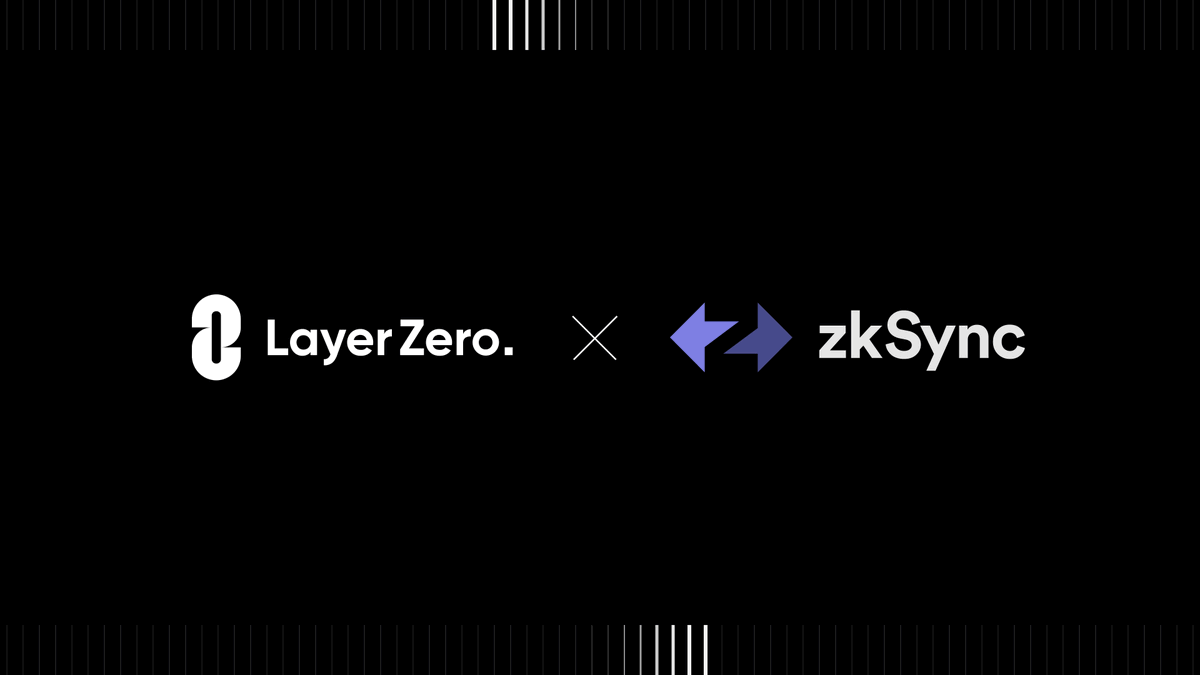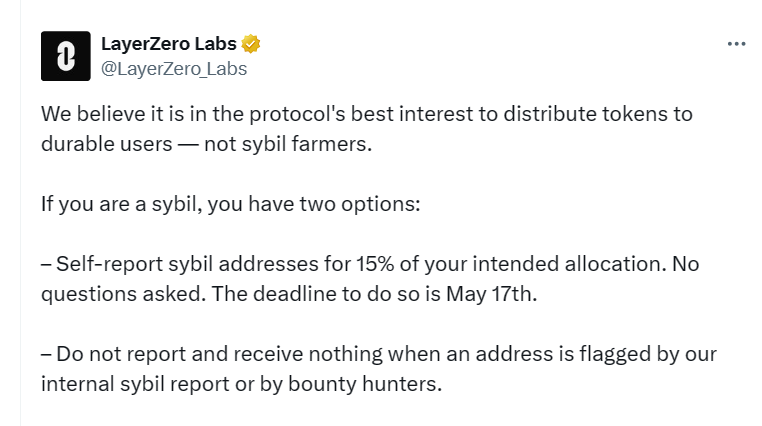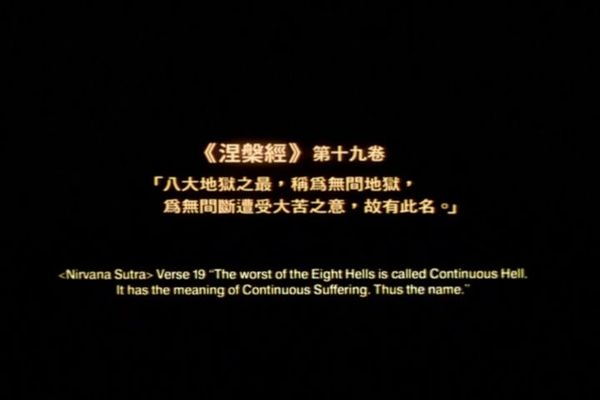Title: "Airdrop Reporting Luoshengmen: Do You Want a Grand Vision or Interests? Cryptocurrency Projects Caught in a Dilemma"
Author: Wang1, Deep Tide TechFlow
Editor: David, Deep Tide TechFlow

Whether it's individuals focusing on experiential projects or studios just for profit, the festive atmosphere on the day of the airdrop is no less than that of the Chinese New Year.
But as the standards for airdrop distribution by project parties become increasingly stringent, this joy is becoming increasingly rare.
Checking for witches has almost become a necessary stage before major project airdrops, and users' main expectations before the airdrop have changed from "how much can I earn from this wave" to "don't get caught by the witch in this wave."
The wool party has gradually formed a classic dichotomy for evaluating projects: checking means lacking vision, not checking means having a grand vision.
Water can carry a boat, but it can also capsize it. The wool party is also an important source of inflated paper data. Faced with users who cannot be ignored, cryptocurrency projects seem to be caught in a dilemma of whether to pursue a grand vision or interests.
And in this dilemma, different projects are expressing different attitudes.
zkSync's Goodwill Gesture
On May 22, zkSync, which planned to conduct a TGE this week, stated, "I absolutely cannot review. The review system is the killer of freedom."

As soon as this statement was made, the community began to become unsettled.
Many speculated that zkSync was ostensibly talking about the dangers of the review system, but in reality, it was not focused on that, but rather revealing a relatively lenient intention towards checking for witches by attacking the review system.
After all, if they set a flag to attack the review, and then check for witches, major projects naturally wouldn't contradict themselves and give everyone a reason to criticize them.
It seems that just expressing an opinion has become news, even though it was just a casual remark without explicitly stating that they won't check the airdrop. How did it lead to collective cheers and excitement in the comments?
This is because this month, another project, LayerZero, which is also of interest to the wool party, implemented an anti-witch mechanism that is stricter than people imagined.
L0, Unleashing an Escalating "Witch Hunt"
In May 2024, the long-awaited project LayerZero announced that it had completed the first season snapshot and declared the launch of an anti-witch activity before the official coin distribution.
Different from the past, where project parties used databases to identify witch addresses, LayerZero this time introduced a "self-reporting" and "reporting by others" mechanism.

Starting from May 4, users who suspected their addresses of being witches had 14 days to self-report to LayerZero. After confirmation by LayerZero, they could retain 15% of the airdrop quota, but addresses not self-reported would have their airdrop quota cleared once identified.
After the "self-exposure" phase, the next 14 days entered the reporting mode, encouraging community users to report witch behavior against each other. Successful reporters could receive a 10% allocation of the airdrop quota for the reported address. If the reported witch address was originally supposed to receive 0 tokens, then the reporter would not receive any reward.
Yes, LayerZero introduced a human nature model—reporting mechanism in the witch hunt. This unexpected thunderous approach caused a great uproar in the community, and more people expressed anger at this mechanism, saying "this is not something that should happen in the crypto community," and "I would rather be shot than surrender." Although there is widespread opposition, under this kind of coercive mechanism, many people still see opportunities.
Before the end of the self-reporting phase, LayerZero CEO Bryan Pellegrino stated on social media that over 338,000 addresses had admitted to being witches. On the second day of the reporting mode, LayerZero claimed to have collected 2312 witch reports and was gradually reviewing them.
With this move, the originally expected airdrop addresses were expected to retain only a small portion. In terms of effectiveness, the project party did achieve the goal of "witch hunting."
Should We Uphold Vision or Interests?
However, the focus of this matter seems to no longer be on the effectiveness of witch hunting.
Airdrops are meant to reward users who have invested real time and effort in the project, and the original intention of anti-witch measures is to ensure fairer distribution of airdrops, protect the value of rewards for genuine users from being diluted by a large number of false users in the hands of studios, and also ensure the healthy development of the project in the future.
From the perspective of protecting fair distribution and industry development, the project party's "witch hunting" behavior is commendable, but the use of reporting, especially a rewarding reporting system, may change the nature of the matter.
The other side of human nature cannot withstand magnification. Under the reporting mechanism, individuals without vested interests may become opponents in a zero-sum game.
When tied to their own interests, the reporting mechanism may become a tool for seeking personal gain. The distrust between individuals will be constantly extinguished in the face of repeated reports, and will be infinitely magnified. This is truly a profound irony for solving trust issues in the context of crypto.
On the other hand, if the project party wants to ensure fair airdrop distribution, shouldn't they inform about the witch hunting mechanism in advance? Instead of waiting for numerous false addresses to inflate the project's data before "revealing their true intentions."
The continuous upgrading of anti-witch mechanisms is a foreseeable trend in the industry's development. Once started, mechanisms like LayerZero's are likely to be imitated by more project parties in the future. The risk of ordinary users being mistakenly affected will also increase. For ordinary users, trying to abandon "more and faster" in terms of operations and turning to "precision and slowness," and thinking about how to be a genuine user, may be a good response strategy.
Airdrop hunting was originally a "mutual prosperity" where you pay and I contribute, and in the end, everyone benefits.
But gradually, it seems that everyone has become involuntarily involved: project parties want a better ecological future, so they will continuously expand their witch hunting methods; wool parties want to smoothly hunt airdrops, so they must continuously improve their techniques to successfully deceive the project parties. Even now, wool parties have to start guarding against each other.
In this "witch hunt," people are constantly playing out a series of "Infernal Affairs," and airdrop hunting has ultimately become an endless torment, with no more free lunches, but rather a tiring struggle for interests.

The arena of human nature has never closed, and I wish you peace in the turbulent waters.
免责声明:本文章仅代表作者个人观点,不代表本平台的立场和观点。本文章仅供信息分享,不构成对任何人的任何投资建议。用户与作者之间的任何争议,与本平台无关。如网页中刊载的文章或图片涉及侵权,请提供相关的权利证明和身份证明发送邮件到support@aicoin.com,本平台相关工作人员将会进行核查。



